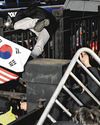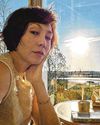SEOUL - It is just two weeks before the final exams. But things have come to a standstill at Seoul's Dongduk Women's University, where students have stopped attending classes since Nov 11.
At the school's annexe outside the main gate, a row of funeral wreaths has been placed in a symbolic gesture. There are protest slogans spray-painted on the ground and protest notes pasted on the building's facade, calling for the university to exercise more democracy and revoke the plans for co-education.
The school gate - pasted with handwritten protest letters and notes - remains tightly shut, while a security guard checks student cards before allowing the women entry into the campus.
News broke on Nov 7 that the school was considering a transition to co-education, and on Nov 11, Dongduk students started occupying the school's buildings in protest. They argue that such a move would go against the school's founding principles, which is to ensure women's equal rights to education.
The protest has since spread to other women's universities like Sungshin Women's University, also in Seoul, and Gwangju Women's University in the south-western part of the country.
South Korea's birthrate woes have led to its school-age population dipping to 7.14 million in 2024 from 9.18 million 10 years ago. The falling enrolment rates have thus prompted many private universities to come up with ways to increase student intake to stay financially viable.
But resistance has been strong. In 2015 and 2018, two women's universities were forced to withdraw their co-educational plans following fierce student opposition.
South Korea has a history of gender-separated education institutions. Women-specific colleges were established mostly from the late Joseon dynasty (late 1800s to early 1900s), by either Christian missionaries or women's activists.
This story is from the December 01, 2024 edition of The Straits Times.
Start your 7-day Magzter GOLD free trial to access thousands of curated premium stories, and 9,000+ magazines and newspapers.
Already a subscriber ? Sign In
This story is from the December 01, 2024 edition of The Straits Times.
Start your 7-day Magzter GOLD free trial to access thousands of curated premium stories, and 9,000+ magazines and newspapers.
Already a subscriber? Sign In

Supporters storm court after Yoon's detention is extended
South Korean President says he sees the deep frustration and anger of citizens

How to thrive at work when you're neurodivergent
In this series, manpower correspondent Tay Hong Yi offers practical answers to candid questions on navigating workplace challenges and getting ahead in your career. Get more tips by signing up to The Straits Times' Headstart newsletter.

Huawei's Pivotal Role in the US-China Tech War
Company is at the center of China's efforts to achieve tech independence from the West

Jeanette Aw back in Japan for patisserie pop-ups
Local actress Jeanette Aw, who in recent years has turned her passion for baking into a patisserie business, is taking her sweet treats to Japan once more.

Schizophrenia patients', caregivers have the hardest time
Hence, the person is in need of treatment, though he may vigorously resist it.

Wolves a different animal: Maresca
Chelsea's leading scorer Cole Palmer is a doubt for the English Premier League clash at home to Wolverhampton Wanderers on Jan 20, manager Enzo Maresca said on Jan 17.

Brighton a thorn in United's side yet again
Manchester United's fleeting uptick in form ended in familiar fashion on Jan 19 with a 3-1 English Premier League defeat by Brighton & Hove Albion at Old Trafford.
Hidden dangers of raw food diet for pets
Feeding pets such as dogs and cats a raw food diet has gained popularity in recent years, with claims that it leads to improved digestion, shinier coats and better dental health.

I Was Never Married, Says Kit Chan
Home-grown singer Kit Chan revealed on the CNA Insider programme The Assembly on Jan 16 that she was never married.

Content creator racks up Snapchat views with LA fire coverage
When social media personality Alex Choi saw the raging wildfire in the Los Angeles neighbourhood of Pacific Palisades, he grabbed his camera and dirt bike and went to document the devastation.